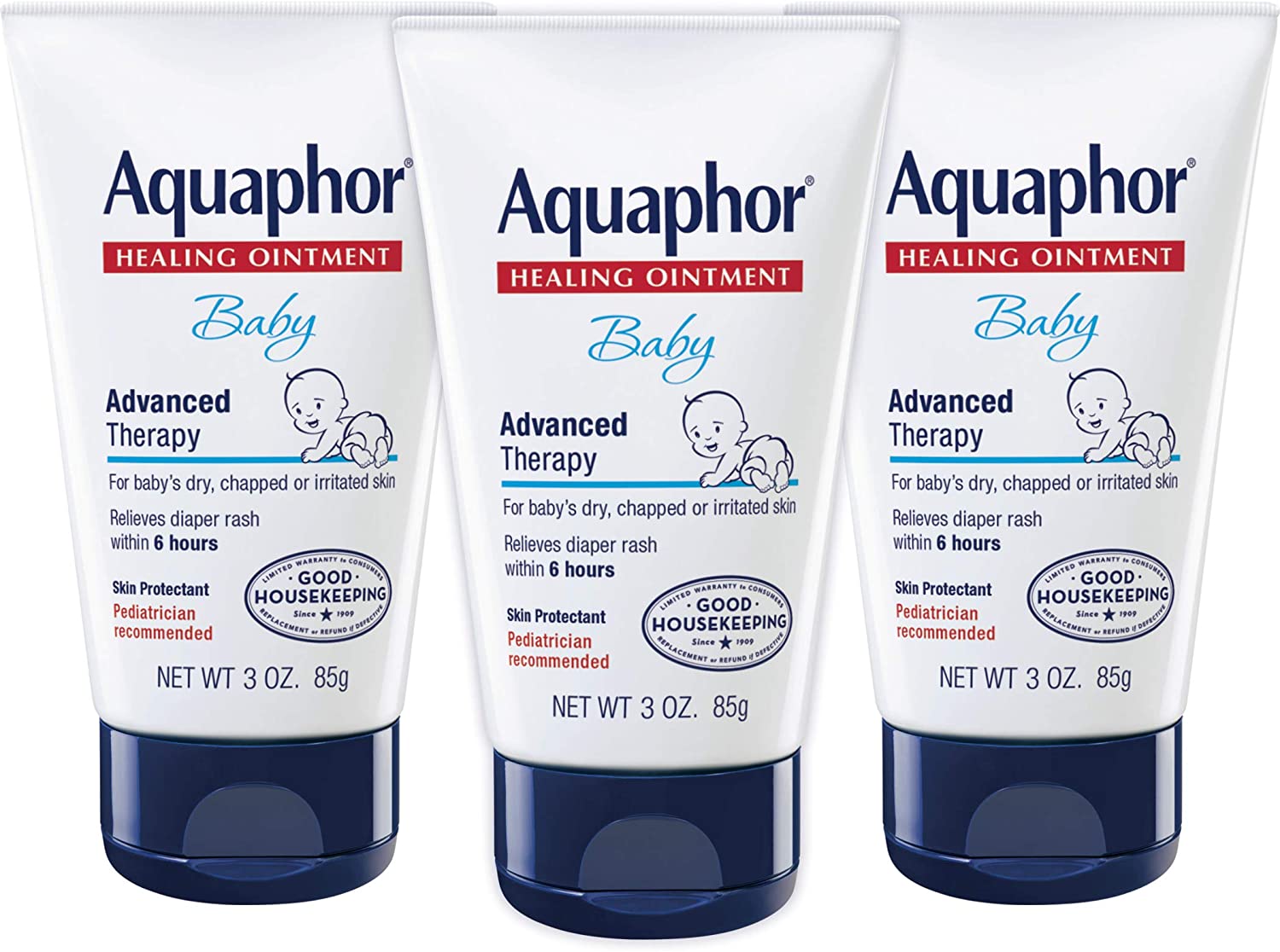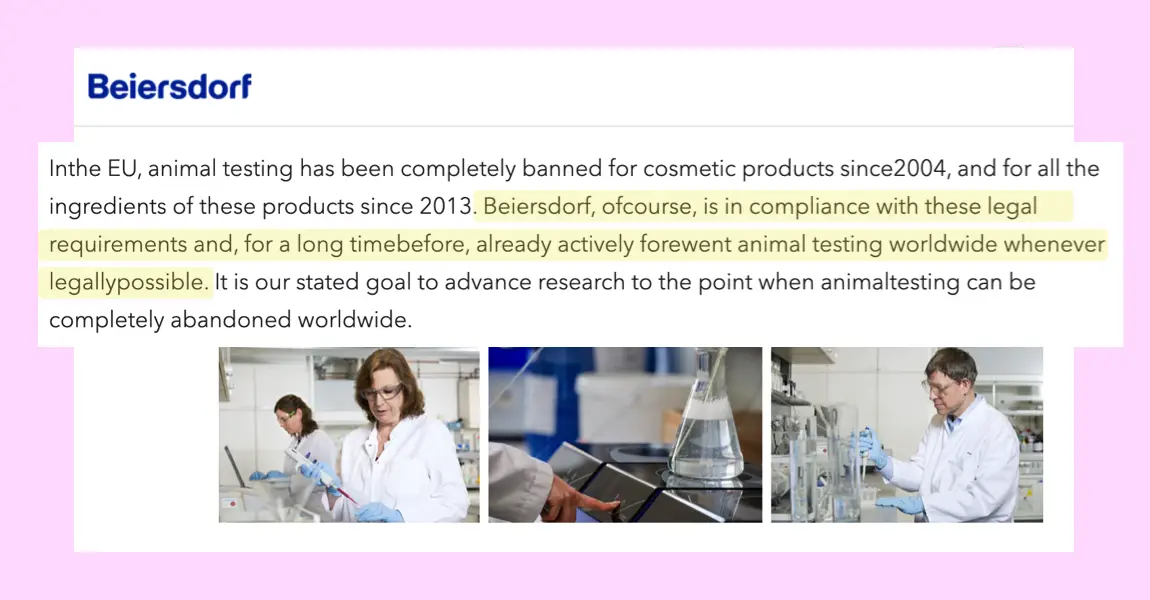Aquaphor’s healing ointments have been trusted family favorites for generations. But it seems like this heritage brand has not moved with the times. While going vegan would mean changing its classic formula – why can’t it go cruelty-free?
Aquaphor is not cruelty-free. It distributes its self care products where animal testing is required by law. Aquaphor does not have products free of animal-derived ingredients. For this reason, it is not considered a vegan brand.
While Aquaphor was first developed in 1925 by Beiersdorf Inc. (almost 100 years ago) – it only started selling directly to customers in the 1980s.
Aquaphor products are popular because of their healing properties.
Its classic formula creates a protective layer on the skin without stopping oxygen flow. This means the formula is safe to apply on nicks, cuts, scars, and cracked skin.
Among its main ingredients are petrolatum, mineral oil, glycerin, and one animal-derived component… but more on that later.
We just can’t understand why the brand isn’t cruelty-free.
Is Aquaphor Cruelty-Free and Vegan?
Aquaphor is NOT Cruelty-Free
It does not:
However, it does:
Aquaphor states that they do not test ingredients or their final products on animals. But no genuinely cruelty-free company or brand would sell products in countries where animal testing is required by law.
Aquaphor does!
Aquaphor is also owned by Beiersdorf – a company that sells to countries where animal testing is mandatory.
This brings us to the next point:
Aquaphor is Not Vegan
This is a bit of an unfortunate issue.
Aquaphor does not claim to have any vegan ranges. And it would be hard to consider any products free of animal-derived ingredients as “vegan” because it’s not 100% cruelty-free.
The few animal-derived ingredients Aquaphor claims to use are:
If you're interested in which products are vegan or finding vegan brand alternatives – keep reading or click on this link: Aquaphor's vegan products.
Animal Testing Policy and History
Oh, you want an animal testing policy?
Unfortunately, you’re not going to get one from Aquaphor.
The brand is clear that it conducts animal testing when required by law and that it does ship to countries like China.
Further than that, they don’t publicly share their stance on cruelty-free personal care at all.
We reached out to them more than once so they could clarify but received no response.
Cruelty-Free Status in 2022
Aquaphor has no official statement regarding its cruelty-free policies and vegan products available on its website. The best we can share is this animal testing statement from Beiersdorf:
Unfortunately, animal testing on cosmetics is only required by law on products entering mainland China.
Stating that they do not conduct any animal testing where “legally possible” makes it seem like animal testing is necessary for some instances.
This is not true. Only products entering mainland China must be animal tested – the brand could choose not to sell in that region.
By choosing to sell cosmetics in mainland China, Aquaphor allows animal testing to take place solely for profit.
Certification
Aquaphor has no cruelty-free certification. As it would be nice to see cruelty-free certification – it cannot happen as long as the brand continues with its current animal-testing policies.
No cruelty-free organization would promote a product that distributes its products to any country that requires animal testing by law.
If a brand wants to receive the ultimate, globally recognized certification from Leaping Bunny, they need to adhere to the following strict criteria:If you see a bunny stamp on the back of your product bottle – that's an excellent sign. But don't let the image itself fool you. A lot of brands are using fake logos to deceive consumers.
Do your homework and see which products are genuinely cruelty-free first. This article will help you: Which Cruelty-Free Logos Can You Trust?
Is Aquaphor Sold Where Animal Testing is Required By Law?
Aquaphor distributes its products in China, where animal testing on cosmetics is required as products arrive at the border.
China has a shocking track record. It is the country with the most animal testing globally, with over 20 million animals used per year.
However, if you live in China or are concerned about its cruel beauty policies, there are a couple of loopholes.
Here's how to find cruelty-free cosmetics in China: Are Cosmetics Made in China Cruelty-Free?
What Aquaphor Products Are Vegan?
Aquaphor doesn’t market or clearly indicate any of its ranges or products as vegan.
Because the brand is not 100% cruelty-free, we wouldn’t consider any products accidentally free of animal-derived ingredients as vegan.
The biggest issue is that most of its products are formulated with beeswax and lanolin.
You can find a complete list of Aquaphor's products on its website. Otherwise, read on for vegan alternatives.
Vegan Alternatives to Aquaphor
If you are vegan or are a strong advocate of cruelty-free personal care – Aquaphor is not the right brand for you.
Luckily, there are many alternatives you can find that are certified cruelty-free and vegan to choose from.
Here are some time-honored body care brands within the same price range that are 100% vegan and cruelty-free.
Is Aquaphor Natural and Organic?
Aquaphor claims to use safe, simple, and clean ingredients. However, it is not considered natural or organic and does not m market itself as such.
Clean vs. Natural Ingredients
The term "natural" is not regulated for cosmetics and skincare. In other words, it doesn't hold one specific meaning.
Usually, it means a product is free of certain more toxic synthetic ingredients, including parabens, phthalates, sulfates, and more. But people also interpret "natural" to mean ingredients of immediate plant origin.
Here's the thing: "natural" is not necessarily good. Just because an ingredient is natural (take olive oil, for example) doesn't mean you should rub it on your skin and sit in the sun to fry yourself like a chicken breast!
All products use a certain amount of synthetic ingredients in their formulas. Aquaphor is no exception – but it does choose to use better or clean synthetics.
If a synthetic ingredient is "clean," it means it is safe and non-toxic for us. Its purpose is to preserve the stability of a beauty formulation.
Does Aquaphor Use Safe Ingredients?
Skin Safe shows Aquaphor has a 91- 100% allergen-free ranking across 38 products.
Many of their products are free of allergens such as common preservatives, parabens, topical antibiotics, coconut, MCI/CI, nickel, gluten, dye, soy, Propylene Glycol, and irritants.
Reading the ingredient list is crucial because Aquaphor is not 100% hypoallergenic or non-comedogenic, and they do not claim to be.
However, certain products are specifically for these concerns, so make sure you buy what your skin needs.
It's also important to note that not all common allergens are harmful ingredients overall. A typical example is lanolin.
The EU/UK Have Stricter Ingredient Regulations
We don’t want to scare you, but you HAVE to read up on any product’s ingredient list before you make a purchase – especially if you live within the United States. The reason why will shock you.
The FDA has only banned or restricted 11 harmful chemicals from cosmetics within the country. Europe and the UK, on the other hand, have banned 1,328!
For good measure, here are some of the ingredients you really want to avoid with skincare:
Are Cruelty-Free Ingredients Safe?
If you’re worried about how safe it is to use cosmetics not tested on animals – please relax and take a sigh of relief.
There is no reason why cruelty-free products shouldn’t be as safe as anything tested on animals.
Not only is it easy to test ingredients without using animals altogether, but there are so many pre-approved ingredients you can use to make cosmetics that there is no need.
If you’re interested, here’s more on the subject: Are Cruelty-Free Cosmetics Safe?
Is Aquaphor Sustainable and Ethical?
Aquaphor does not show any sustainability and ethical initiatives on its brand website. However, it does follow its parent company Beiersdorph’s company values.
All of the houses’ brands need to adhere to the following strict criteria:
It's no secret that the world has a huge waste problem, and cosmetic brands only make it worse by using unsustainable packaging and harmful ingredients.
Currently, Beiersdorf is taking environmental action in these ways:
Beiersdorf sustainable goals include:
We love all these initiatives but think they’re optimistic. Don’t worry we want to keep an open mind and see what Beiersdorf achieves in the next three years!
Unfortunately, we don’t know how much of their current initiatives or goals apply to Aquaphor.
Final Thoughts
Aquaphor is a well-developed body care brand loved by people because of its safe formulas. Even the most sensitive skin issues can handle their healing ointment.
We appreciate that its parent company has a certain amount of sustainability goals – but the brand's openness about its ethics has a long way to go.
Firstly, the fact that Aquaphor is not cruelty-free means it takes a step in the wrong direction.
As much as it claims to be against animal testing – the brand chooses to distribute to China, which is a direct conflict of interest.
They also do not cater to people who want purely plant-based products, which isn’t ideal either.
Finally, Aquaphor doesn’t actively share or speak about any sustainable initiatives it's invested in.
Yes, there are certain things it is expected to follow as a part of Beiersdorf, but that doesn’t show an active effort on the brand’s behalf.
We hope to see a change in all the issues we’ve encountered, but it is unlikely right now.
As consumers, it is up to us to stand for what we will and won't accept from our cosmetics. This is something we cannot accept.


